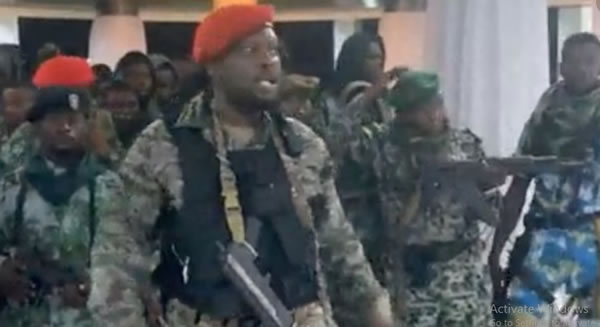
Three Americans involved in a brazen weekend attack on Congo’s presidential palace formed an unlikely band under the leadership of eccentric opposition figure Christian Malanga, who dabbled in gold mining and used cars — before persuading his Utah-born son to join in the foiled coup, according to officials’ description of events.
Six people, including Malanga, were dead and dozens arrested, including the three Americans, following that attack and another on the residence of a close ally of President Felix Tshisekedi, the Congolese army spokesperson Brig. Gen. Sylvain Ekenge said.
Ekenge said Malanga was killed in a shootout early Sunday with presidential guards. The situation “is under control,” he said.
Authorities said they were still trying to untangle how Malanga’s 21-year-old son, Marcel, went from playing high school football to allegedly trying to unseat the leader of one of Africa’s largest countries.
“My son is innocent,” his mother, Brittney Sawyer, wrote in an email to The Associated Press, declining to elaborate.
Sawyer had regularly posted proud family photos on social media, including one in December showing Marcel, a young sister and a toddler hugging in matching Christmas pajamas. In 2020, she posted photos of Marcel lifting weights and dancing during COVID lockdown.
In a Facebook post early Monday, Sawyer angrily wrote that her son had followed his father. “This was an innocent boy following his father. I’m so tired of all the videos being posted all over and being sent to me. God will take care of you people!”
One video that circulated on social media showed her son alongside a bloodied white man, whose identity was unclear, both covered in dust and surrounded by Congolese soldiers. Marcel has his hands raised and a frightened look on his face.
It was far from the persona that Marcel appeared to have been building in videos recently posted on Facebook and TikTok showing him posing with stacks of dollar bills and talking about women.
His father, Malanga, had described himself on his website as a refugee who thrived after settling in the U.S. with his family in the 1990s. He said he became a leader of a Congolese opposition political party and met high-level officials in Washington and the Vatican. He also described himself as a devoted husband and father of eight.
Court records and interviews paint another picture.
In 2001, the year he turned 18, Malanga was convicted in Utah in incidents including assault with a firearm that resulted in a 30-day jail sentence and three years of probation. That same year, he was charged with domestic violence in one assault incident, and battery and disturbing the peace in another, but he pleaded not guilty, and all counts were dismissed.
In 2004, he was charged with domestic violence with threat of using a dangerous weapon, but he pleaded not guilty, and the charges were dismissed. Since 2004, records show several cases related to a custody dispute and a child support dispute. It is unclear if the disputes involved Sawyer.
Malanga described himself as the organizer of the United Congolese Party, a movement aimed at organizing emigres like him against the “current Congolese dictatorship government regime.” He also described himself as president of the “New Zaire” government in exile and published a manifesto with plans for creating business opportunities and reforming Congo’s security services.
Photos on Facebook and his website show him meeting then-senior U.S. political figures, including former Utah Rep. Rob Bishop and New York Rep. Peter King.
Bishop told the AP he did not recall the meeting and couldn’t tell when the photo was taken. King could not be reached for comment.
Dino Mahtani, an independent researcher into African issues, said he first heard of Malanga in 2018 while serving as a political adviser to the United Nations in Congo. He said Congolese authorities voiced suspicions that Malanga was involved in a purported plot to kill then-President Joseph Kabila.
In an interview, Mahtani said he had never met Malanga but thinks Malanga was obsessed with capturing some form of power in Congo.
He also speculated Malanga had been set up or betrayed in the weekend attack, given the implausible way it was carried out.
“Somebody put him up to this. It could be external plotters but given his previous close relationship with at least one of Tshisekedi’s current military commanders, there’s some chance the plot was known about internally and this allowed them to move quickly,” Mahtani said.
The alleged coup attempt began at the Kinshasa residence of Vital Kamerhe, a federal legislator and a candidate for speaker of the National Assembly of Congo. His guards killed the attackers, officials said.
Malanga, meanwhile, was live-streaming video from the presidential palace in which he is seen surrounded by several people in military uniforms wandering around in the middle of the night. He was later killed while resisting arrest, Congolese authorities said.
Congo officials have not commented on how the attackers were able to get inside.
“It’s really difficult to imagine how 20, 30 guys thought that by storming the presidential palace when nobody is around at 4 a.m. in the morning could somehow take over the Congolese state,” Mahtani said.
A second American allegedly involved was identified as Benjamin Reuben Zalman-Polun, according to images of a U.S. passport circulated by Congolese media. He graduated from the University of Colorado and attended business administration classes at Georgetown University, court records indicate. He later started a commodity trading business and worked as a courier and Uber driver — the records show.
His connection to Malanga appeared to be through a gold mining company that was set up in Mozambique in 2022, according to an official journal published by Mozambique’s government, and a report by Africa Intelligence newsletter.
No information was released on the third American.
The U.S. Embassy in Kinshasa said it was aware “U.S. citizens might have been involved in Sunday’s events,” adding in a statement that it would cooperate with authorities “as they investigate these violent criminal acts.”
Source: voanews.com























